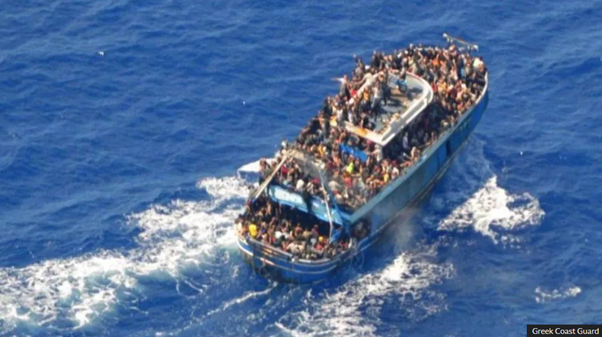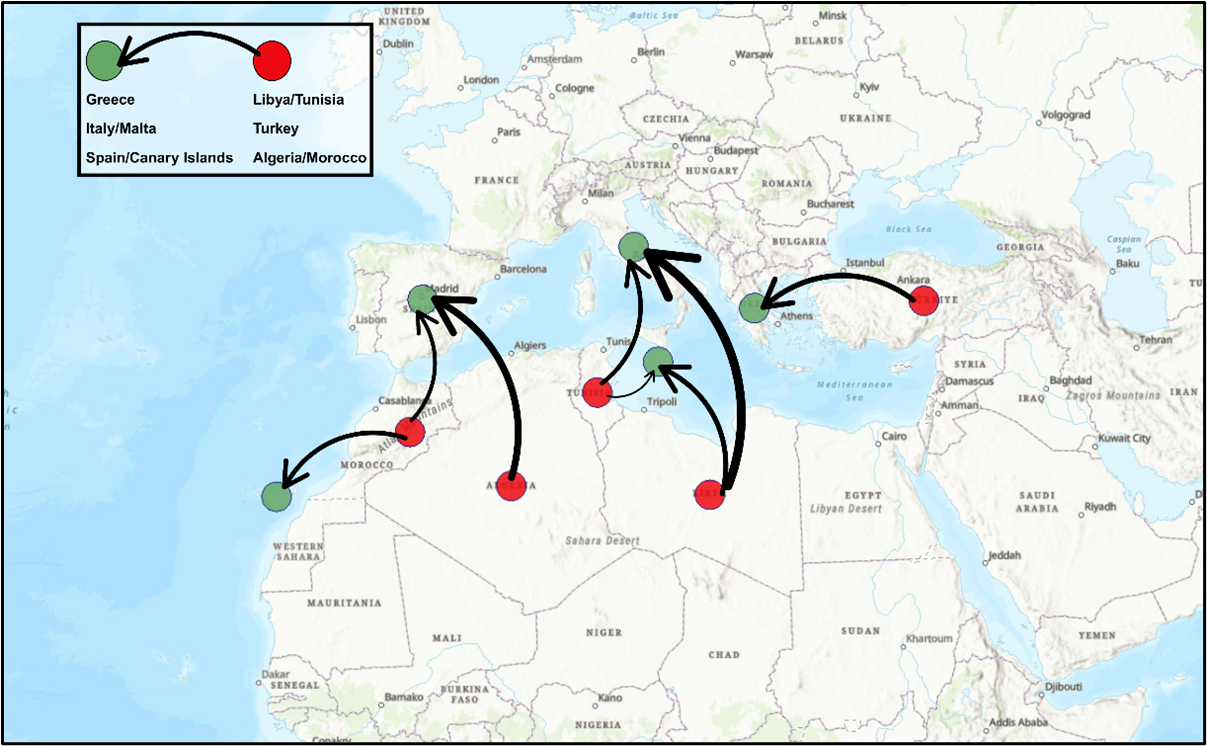| 11 June 2025 | Location: Pylos, Greece |
Incident Details
On 14 June 2023, the fishing trawler ADRIANA, carrying up to 750 migrants from Syria, Egypt, and Pakistan, capsized and sank in international waters off Pylos, within Greece’s search-and-rescue zone. The Hellenic Coastguard monitored the vessel for 15 hours without initiating a timely rescue, resulting in only 104 survivors and over 600 presumed dead. In June 2025, 17 coastguard officers, including the LS-920 captain, were charged with causing the shipwreck, failing to assist, and endangering lives, based on survivor allegations of a botched towing attempt.

Figure 1: the ADRIANA – full to the gunnels!
Comment. The Mediterranean migration crisis has intensified dramatically over the past five years, driven by both illegal and irregular migration flows. Illegal migration, often facilitated by organised smuggling networks, contrasts with irregular migration, where individuals cross borders without proper documentation but may not be involved with criminal intermediaries. According to UNHCR and IOM data, sea arrivals and deaths across Italy, Cyprus, Malta, Greece, and Spain report:
- 2018: 141,472 arrivals, 2,277 deaths
- 2019: 123,663 arrivals, 1,510 deaths
- 2020: 95,666 arrivals, 1,881 deaths (affected by COVID-19 restrictions)
- 2021: 123,540 arrivals, 3,231 deaths
- 2022: 160,070 arrivals, 3,017 deaths
- 2023: 270,700 arrivals, 4,110 deaths (a 36% increase from 2022)

Figure 2: Mediterranean Migration Routes
In 2023, the Central Mediterranean route alone saw 212,100 attempts, with 151,500 (71%) reaching Europe and 60,600 (29%) intercepted or rescued and returned to North Africa. Tunisia notably intercepted 75,000 migrants, doubling its 2022 figures. By March 2024, 41,201 migrants had reached Italy via the Central Mediterranean, while 47,000 arrived in the Canary Islands, with a total of 4,808 deaths recorded in the first five months of the year. As of mid-May 2025, Canary Islands arrivals dropped 34% to 10,800 compared to 2024, yet the 28 May 2025 El Hierro incident tragically added seven more deaths. Rescue efforts in 2023 saved or intercepted 60,600 migrants, with similar numbers in 2024. Over 15,000 smugglers were arrested in 2022, highlighting the pervasive role of criminal networks. Globally, 8,565 migrant deaths were reported in 2023, including 569 Rohingya in the Bay of Bengal and 321 in the Caribbean in 2022. A March 2025 Yemen/Djibouti capsizing left two dead and 186 missing. Since 2014, the Mediterranean accounts for 46% of global migration deaths (28,854 of 63,285 total).
The International Convention for the Safety of Life at Sea (SOLAS) mandates shipping companies to assist those in distress and provide humane treatment. However, logistical challenges (e.g., unsafe ports) and financial burdens (e.g., daily diversion costs up to €75,000) complicate these duties. Neptune P2P Group’s reports – such as “A Human Tide – Global Migration in the Maritime Domain” (September 2023 and February 2025) – provide detailed analyses of these trends and preparation needs.
Assessment. The ADRIANA shipwreck highlights a critical lack of preparedness in the shipping industry amidst the Mediterranean migration crisis. Despite SOLAS obligations, many maritime operators critically lack training, resources, and protocols for mass rescue scenarios, risking crew safety, vessel stability, and incurring significant legal, reputational, and financial losses. The Hellenic Coast Guard’s alleged mishandling underscores this: insufficient migrant-specific SAR training leaves crews ill-equipped for crowd control, medical emergencies, and MRCC coordination, leading to delayed responses, safety hazards, and severe legal repercussions.
To bridge this gap and safeguard operations, companies must adopt a robust preparedness strategy focusing on:
- Comprehensive Crew Training: drills on rescue techniques, crowd management, security (of crew and the vessel) and basic medical care.
- Enhanced Coordination: seamless communication with Maritime Rescue Coordination Centres (MRCCs) for coordinated rescue efforts.
- Contingency Plans: Detailed protocols for legal compliance, crew safety, post-rescue logistics, including insurance coverage.
These proactive investments foster operational resilience, enabling companies to uphold their duty of care, ensure employee safety, and maintain business continuity. To effectively achieve this, Neptune’s “Migrant Assistance at Sea Training Course” offers a tailored solution covering SOLAS obligations, SAR skills, and crisis management, empowering crews to navigate high-stakes scenarios and safeguard both lives and company interests – and avoid litigation.
Speak to our experts today to discuss your migrant handling training for your crew. Contact us at – Neptune P2P Group.
